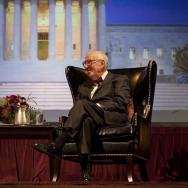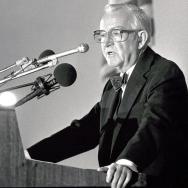John Paul Stevens, a long-serving Supreme Court justice who traced his preparation as a lawyer to the University of Chicago, died Tuesday. He was 99.
A Hyde Park native, Stevens, AB’41, attended the University of Chicago Laboratory Schools from kindergarten through high school, walking just a few blocks from his family’s home near the corner of 57th Street and Kenwood Avenue. He then enrolled in the undergraduate College, studying English literature and graduating Phi Beta Kappa.
Nominated in 1975 by President Gerald Ford and confirmed unanimously, Stevens joined the Supreme Court with a reputation as a moderate conservative. His nomination was recommended to Ford by then-U.S. Attorney General Edward Levi, who had served as president of the University and dean of the University of Chicago Law School.
Stevens served on the Supreme Court for more than 34 years, leaving in 2010 with the third-longest tenure behind his predecessor William O. Douglas and 19th-century justice Stephen Field. At 90, Stevens also retired as the second-oldest justice to serve on the nation’s highest court, behind Oliver Wendell Holmes.
That Stevens became known as a liberal stalwart of the Supreme Court was due more to the appointments that followed him, according to Geoffrey Stone, the Edward Levi Distinguished Service Professor at the University of Chicago Law School.
A leading legal scholar, Stone said the confirmations of justices such as Antonin Scalia, Clarence Thomas and Samuel Alito moved the Court “steadily and aggressively to the right.” Those changes recast Stevens as a liberal voice, one who increasingly disagreed with his more conservative colleagues. His dissenting opinions in Bush v. Gore, District of Columbia v. Heller, and Citizens United v. Federal Election Commission were “brilliant,” Stone said, ranking “among the strongest dissents that any justice has written in the last half-century.”
During a 2011 visit to UChicago, Stevens reflected on the one vote he regretted. In 1976, he had sided with the 7-2 majority in Jurek v. Texas, which upheld Texas’ claim that capital punishment was not cruel and unusual and did not violate the Constitution.
Stevens explained his reversal by referencing the death of Troy Davis, executed in 2011 for the killing of a police officer two decades earlier. Davis always maintained his innocence, and civil rights groups had argued for the commutation of his sentence, citing recantations of witness testimonies.
The execution of Davis, Stevens said, “provides an example of one reason why the death penalty, as a matter of policy, is unwise if there is even a minimum of doubt.”
He announced his retirement from the Supreme Court on April 9, 2010. His vacancy was filled four months later by Elena Kagan, a former professor at the University of Chicago Law School.
How poetry prepared Stevens to study law
While a University of Chicago student, Stevens studied poetry with novelist Norman Maclean, PhD’40, the renowned author of A River Runs Through It and other works. That work prepared him for his legal career, Stevens said in 2002, when he received an Alumni Medal from the University of Chicago Alumni Association.
“He taught me to read every word of a poem,” he recalled in an address at Rockefeller Memorial Chapel. “The study of English literature, especially lyric poetry, is the best preparation for the law… That training helped me later, when trying to decipher law statutes.”
Stevens had considered studying Shakespeare in graduate school, but another professor prompted him to instead take a correspondence course in cryptography offered by the Navy. According to a 2002 article in the University of Chicago Magazine, Stevens was commissioned as a Naval officer on Dec. 6, 1941, a day before the bombing of Pearl Harbor. Stevens eventually earned a Bronze Star for his work as a codebreaker during World War II.
He then attended Northwestern University Law School, eventually clerking for Supreme Court Justice Wiley Rutledge and becoming an expert in antitrust law. In addition to his private practice, he lectured at the University of Chicago Law School during the 1954-55 school year and in the summer of 1958.
Stevens is survived by his children, Elizabeth Jane Sesemann and Susan Roberta Mullen; nine grandchildren; and 13 great-grandchildren. He was preceded in death by his first wife, Elizabeth Jane; his second wife, Maryan Mulholland; his son, John Joseph; and his daughter, Kathryn.

